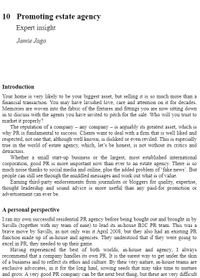Jamie Jago (Savills) is the author of ESTATE AGENCY: Expert insight
ESTATE AGENCY
The Chapter
Estate agents are, or should be, experts in marketing property. They are not all PR experts but must understand the significance of building and managing a company’s all-important reputation. As property matters to everyone, the appetite for property stories – from house price forecasts to eye-catching interiors – is strong. Knowing when and how to engage with the media is key. This chapter is a personal reflection on how embracing effective, well-founded PR as a business essential, never an afterthought, will pay dividends in an industry that is not always greeted with trust and respect.
The Author
Jamie began her PR career in 1987 as an in-house PR manager at a small boutique estate agency in London. Three years later she set up Jago D’Arcy Hale, specialising in residential property in the UK and abroad. In 2002 Alison Dean joined as co-owner and the firm was rebranded Jago Dean. Widely regarded as the leading PR firm in the industry, it was acquired by Savills in 2008 where Jamie remains to this day running the B2C press office.
An interview with the author
What is you background and your experience of promoting estate agency?
I ‘fell’ into PR in November 1987 when I got a job handling PR for a boutique estate agency. I’d never done PR and knew nothing about property but when I read what they wanted to achieve, I just knew I’d be able to do it. I then learned as I went along
Why did you choose this career?
I’m not sure I did choose it, as you can see from my previous answer, it chose me
What motivates you?
The thing that motivates me is that I love making a real difference to a business, department or client via PR. Whether that’s the right sort of editorial or offering advice which gives them an advantage. Few feelings beat the buzz of seeing a great editorial piece. Also, I love the media and journalists and how they work
What benefit do you feel the book will bring?
PR is not generally understood fully by anyone who isn’t immersed in it and appreciates that it is an art and not a science. There are a lot of PR agencies out there but very (very) few I’d recommend to people. I’m hoping this book will give property people an insight in to how it works. The more they know, the better equipped they are to get involved successfully either in-house or with a PR professional.
How does the property industry benefit from PR?
PR is the most cost effective way of raising and maintaining your profile. It is the most important tool in the comms armoury.
What would you say are the key principles of good property PR?
The key principles are: in-depth knowledge of how the media works, intuition, creativity, outstanding writing skills, outstanding communication skills.
What are the key issues that property PR faces?
PR evolves but the basics remain the same. The dedicated property pages may shrink in number as the market demands change but fewer pages means it’s even more valuable. The news pages never lose their appetite for news on what has happened, is happening and will happen in the property market.
How is property PR changing?
The meteoric rise of social media and online means some of the lines between marketing and PR are becoming blurred. Who writes the blogs for your website? PR. Who amplifies them? Marketing. Because Twitter, LinkedIn, Instagram have different characters and audiences, it’s vital that PR which is so efficient at crafting messaging, is involved.
What changes do you expect to see in the next decade?
The digital arena will continue to expand. Over the next decade, I think many more companies will in part, become their own publishers owing to the amount of content that is hosted and put out in public. Blogs, Tweets, LinkedIn posts and Instagram images are becoming more important. Having said that, people must never lose sight that good quality editorial (both online and offline) is still the holy grail.
What does the PR industry need to do to move with the times?
All you have to do to keep up with the times is be educated and informed, which is down to you– then you use your judgment.
How important is creativity in what you do?
Creativity is first among equals with regard to PR skills. Without creativity you do not see the story or spot the opportunity or make the odd silk purse out of a sow’s ear. Creativity keeps you at the forefront and without it, any PR campaign or strategy is doomed to fail.
What are the key learning points that are communicated in your chapter?
PR is pretty simple, it’s just a case of common sense and good manners. You may not be a natural PR person but you can get a grasp of how it works and why.
Which communications tactics / methodologies do you feature?
PR rules haven’t changed since I started over three decades ago; the rules of engagement are still the same. Who are you trying to reach? What are you wanting to communicate? What is the best way of communicating this?
How can readers of your chapter continue to learn about the subject?
If you are genuinely interested, it’s easy to learn. Read national newspapers and magazines (news, features etc) read local papers (ditto) watch and listen to broadcast news, get on Instagram, Twitter and LinkedIn. What seems to be working, what doesn’t? Whose profile do you respect and why? Finally, try to never let your ego get in the way – it never ends well when you do.

